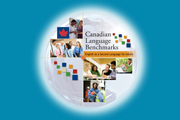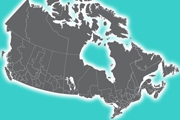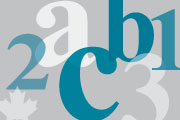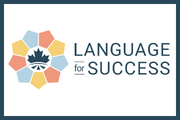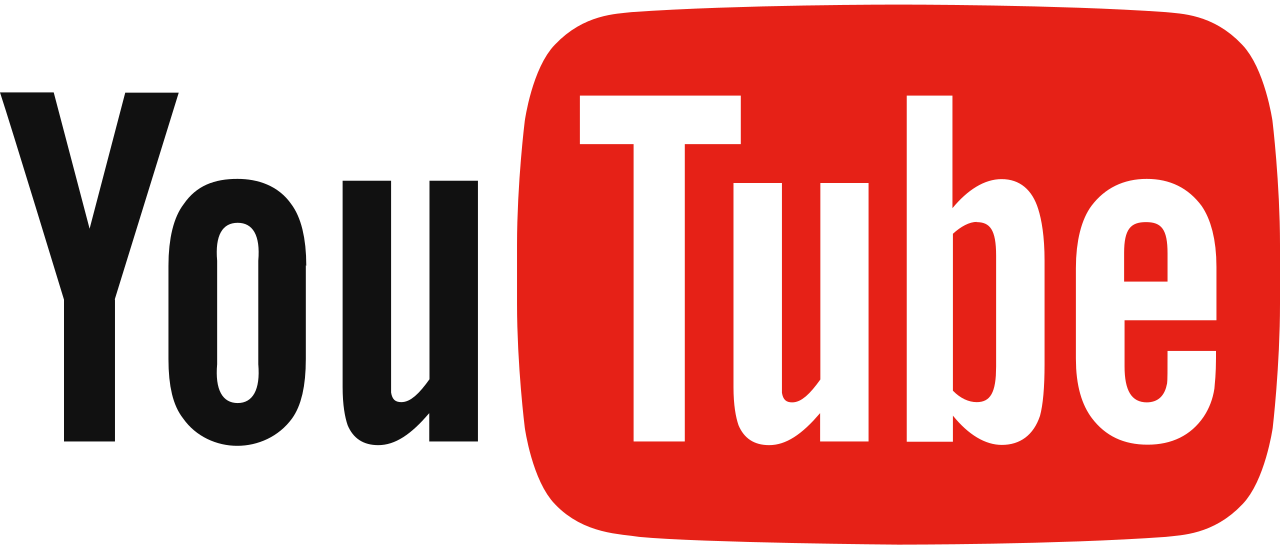For Language Learners
Language Benchmarks
In Canada, you will speak English:
-
at work
-
in stores to buy food
-
at school
-
with new friends
-
with doctors
-
with neighbours
-
to give information
-
ask questions
-
take a bus
The Canadian Language Benchmarks or CLB is used in Canada to teach and test language learning for adults. It is important for you to understand the CLB if you plan to go to English class, train, look for work or study at a college or university.
The Levels
The benchmarks are organized in 3 stages and 12 levels. The benchmarks describe tasks that people can do in listening, speaking, reading and writing. If you are new to English you may be Level 1 or Level 2 or Level 3 or Level 4. The chart shows how the benchmarks are arranged.
Many adult ESL programs in Canada use the CLB. Students and teachers use CLB to understand what English is needed for daily life in Canada. The CLB does not list grammar or vocabulary. It lists tasks for everyday, real English use. A task is something you can do in English.
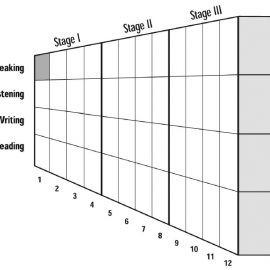
What is your level of English?
Click on student level to learn about it. Read about the level.
Is this how you use English? This will help you learn your level.
Examples of Speaking and Writing
Would you like to see and hear how a person sounds at a benchmark? Can you see and hear someone with similar skills to yours? What CLB level is attached to the person who speaks or writes like you?
To hear an example of how a person at a benchmark level might speak, click on a sample. Each of the people you will hear was asked to talk about customer service. They were given 1 minute to think before they began to speak.
CLB 6-7 Speaking
Helen (Level 6)
Bea (Level 6)
Korhan (Level 7)
CLB 8-10 Speaking
Muhammad (Level 8)
Maria (Level 10+)
CLB 6-8 Writing
Sample 1
Dear Ms. XXXXXXXX,
I really like the way you teach in our class. I am happy that I got a teacher like you to get oriented myself with the Canadian Job market. In fact the Program is good enough for the new immigrant like me and I got the chance at the right place at the right time. Your valuable teachings will help me a lot to reach me in my desired destiny with confidence. I would like to thank you for the assistance and advice you are continuously pouring on us.
My short term goal is to get a job in Hotel and/or Restaurant sector as a front office assistant. Though I had 2 years work experience in reputed Travel agencies in India I want to switch over. As far as I know in Travel Agencies the rate of salary is very low and low salaried income will be a big problem to sustain myself alone in Toronto city.
In my long term goal I have plans to invest in real estate market and might start a business because I don’t like to spend and end my life as an employee and am compelled to pay a huge amount of tax to Government when I work, when I earn and when I will die. The employee is the one who get taxed highly on salaried income by the Government. If we move to other sectors like Passive income, portfolio income, business and investing we have lot of loopholes to save tax and enjoy other facilities. From this point of view I would like to congratulate you that you formed a company to serve people for which I really feel good and proud of you.
Wish you a good luck!!
Regards
XXXXXX XXXXX
Sample 2
From: “XXXXXXXX”
To: “XXXXXXXXXXX”
Sent: Tuesday, June 06, 2006 2:54 PM
Subject: Hello, how are you?
Dear Ms. XXXXXX;
I have been very confused at the beginning of this programme regarding the outcomes of the programme to me. But everyday I came to the class, I learned a lot of different things about the work expectations and the right way to find. So I am very thankful for your patience and help to all of us in the class.
I am much more confident what to do for looking for a job, how to be successful in the interviews and what I have to do in an organization? I really do believe that all the certificates we get during the program will have a positive impact to the employers. Besides all these good things I have still some concerns about myself related my resume. I know I have to change something in it.But I am sometimes lost in the dark about how to get a job in my field. Because according to my past interview experiences in the GTA area, I have sen that people find my resume over qualified and did not want to give a mid-management level. And when I apply for a management position they are willing to hire a much more experienced person who has got Canadian experience.
From the things I have noticed from the knowledges you share with us, Canadian companies are looking for people who has got the managerial skills to take the initiative and accomplish the goals of the company within their mission statement. This vision you have given to us make me much more optimist than before for my future in Canada.
Thank you very much for your cooperation with us and I hope we will have the chance to come together from time to time after we have find out the jobs we are looking for and share our experience again. I will be appreciate to hear from you related your observations about myself and I hope this is also a nice experience for you too.
Sincerely Yours,
XXXXXXXX XXXXXXXX
Sample 3
Hello Ms XXXXXX,
I am, one of your students from the Hospitality class. My name is XXXX. I came from Turkey. I have been to Canada almost 6 months. I really happy to be here and to meet new people, to know new culture. Your hospitality course is very usefull for me because I belive lifelong lerning. I really like to refresh my knowledge. I would like to acknowledge you about my backgroung.
I graduated from Tourism and Hotel Service Department In Bilkent University.During my summer trainning I worked for Turkish Airline as a ticket reservation clerck. I learned Troya system that is used for ticket reservation. Moreover, I also worked as a domestic ticket sales agent for Turkish Airlines. After my graduation, I started to work at theAtaturk International Airport as a FIDS ( fligth information display system) shift leader during 1,5 year. After my success my manager promoted me as a Assistant Operation Manager. I was working in this title during 3,5 year.
I would like to give some information about my hard skills,soft skills and language skills. I know Ms Office programs such as Word, Excell, Powerpoint, Outlook. Furthermore I have also some language skills. My native language is Turkish. English is my second language. I also know French and I have basic Spanish knowledge. I would like to explain my soft skills while giving an example. Before becomming to assistant operation manager I was working as a FIDS shift Leader. All of us were new and we were not familiar with the system. After a while, I recognize that my colleages were doing lots of mistakes while doing their jobs. I decided to retrained them during 1 week and finally our team became the most successful team of the month.
Canada is a Multinational Country, I belive that I am the right person to be hired.
Best Regards,
XXXXXXXXX
CLB 9-10 Writing
Sample 1
June 6, 2006
Dear XXXXXX,
As you requested me to send you and e-mail regarding my future plan. It is my pleasure to discuss about my future plan with you. As you know that I had 10 years experience in airport management, customer relations, travel and tourism, and marketing. I worked in travel and tourism department of Aero Asia International Airlines. I had been receiving travel and tourism from ass over the world especially from CIS countries and Russia. I can speak Russan language fluently that’s why I was able to handle tourist professionally. I love to travel, meet different people, earer to know their culture and to see different places.
My aim and objective is to find a tourism related job within 2 month because my employment insurance is going to finish by August 2006, after having Canadian tourism & hospitality program, I feel confidence that now I will be able to find a job. Once I find a job in tourism field then I want to enter in any airlines so that I can utilize all my capabilities and travel and tourism experiences.
I think, now you will be able to understand about my action plan. To pursue my career I am going to search my job now.
Regards,
XXXXXX XXXXX
Sample 2
Dear XXXXXX,
I would like to take this opportunity to thank you for this past 2 weeks. I have learned a lot from this course. I feel confident that I am going to be in a better position to apply for work after the completion next week and Monday.
My future plans wold include finding a work where I could use my knowledge and gain Canadian experience here in Toronto. I am also considering moving to the province of Alberta in the future. I think that my possibilities to find work in the Tourism industry would be greater in this province, due to the big demand for staff.
My plan for this weekend is to study and do well on my test for Monday.
Many thanks
XXXXXX
IRCC informational videos
IRCC’s You Tube channel
Features a variety of videos to help new immigrants when they first arrive in Canada. Explore their YouTube channel to learn more about the services at your disposal from your new government.
Language training options for newcomers to Canada describes the language training and learning opportunities offered through the Settlement Program. This video will help newcomers understand what they can expect from different types of language programming, including formal language training, employment-related language training, and informal language learning.
How to Be a Good Language Learner
The following information is from a Manitoba Publication.
Organize your time
-
Make a detailed schedule of your week and book some study time into your schedule. If possible, plan to study at the time of day when you work best.
- Be sure to give yourself short breaks and reward yourself when you’ve studied well.
- Make your own study schedule. Make a chart of the 7 days of the week (along the top) and the hours of the day, from about 6 a.m. until midnight (along the left side). Use a new chart for each week. In your chart, write down all the things you have to do, such as work, classes, meals, picking up your children, or special events. Schedule in some study time each day. Don’t forget to schedule in a little exercise and free time too! Try to find a balance, as much as possible, between study, work, family and recreation. Carry your schedule with you, so you don’t forget your activities and study time. You can buy a Journal or Day timer that allows you to schedule for up to a year. Most working Canadians carry one of these.
Find a good place to study
-
Work in a quiet environment at a table or desk that has enough room for everything you will need, such as: a textbook, a dictionary, a notebook and pens, pencils and highlighters.
Find a partner (or a few)
- Sometimes it helps to study English with someone else. You can ask each other questions and quiz each other. Discussing what you have read with your study partner will help you clarify your thinking.
How Do You Learn Best?
When you know how you learn, you can choose learning techniques that will help you to study better.

Learning by Listening
Some people are able to remember things better if they hear information. They enjoy reading aloud or studying with others, listening to recorded books or information, or listening to class presentations

Learning by Seeing
Some people remember what they see and prefer written instructions. They like visual sources of information such as videos or the internet. They learn better when they see charts and diagrams, posters, flashcards or textbooks with pictures.

Learning by Doing
Some people learn better if they do a task themselves. They are “hands on” learners. They understand directions best if they write them down. They remember what they learn if they draw pictures and diagrams, make models, solve puzzles, participate in an activity and use their hands.
Self-Assessment
How well do you use English?
Remember that the CLB looks at tasks we do and the language we use when we do them.
Who do you speak to every day?
– neighbours
– co-workers
– friends and family
– government people
– your teacher
– the bus driver
What listening do you do everyday?
– the radio
– television programs
– a teacher or trainer
– on the telephone
– friends
– people at work
– the people in the grocery store
What do you read everyday?
– the newspaper
– television guide
– work manuals
– street signs
– bus schedules
– textbooks
What do you write every day?
– letters to friends
– e-mails
– memos or reports at work
– notes to teachers
– lists for yourself of things to do or buy
– charts and graphs to organize or communicate information
Canadian Language Benchmarks – Online Self-Assessment
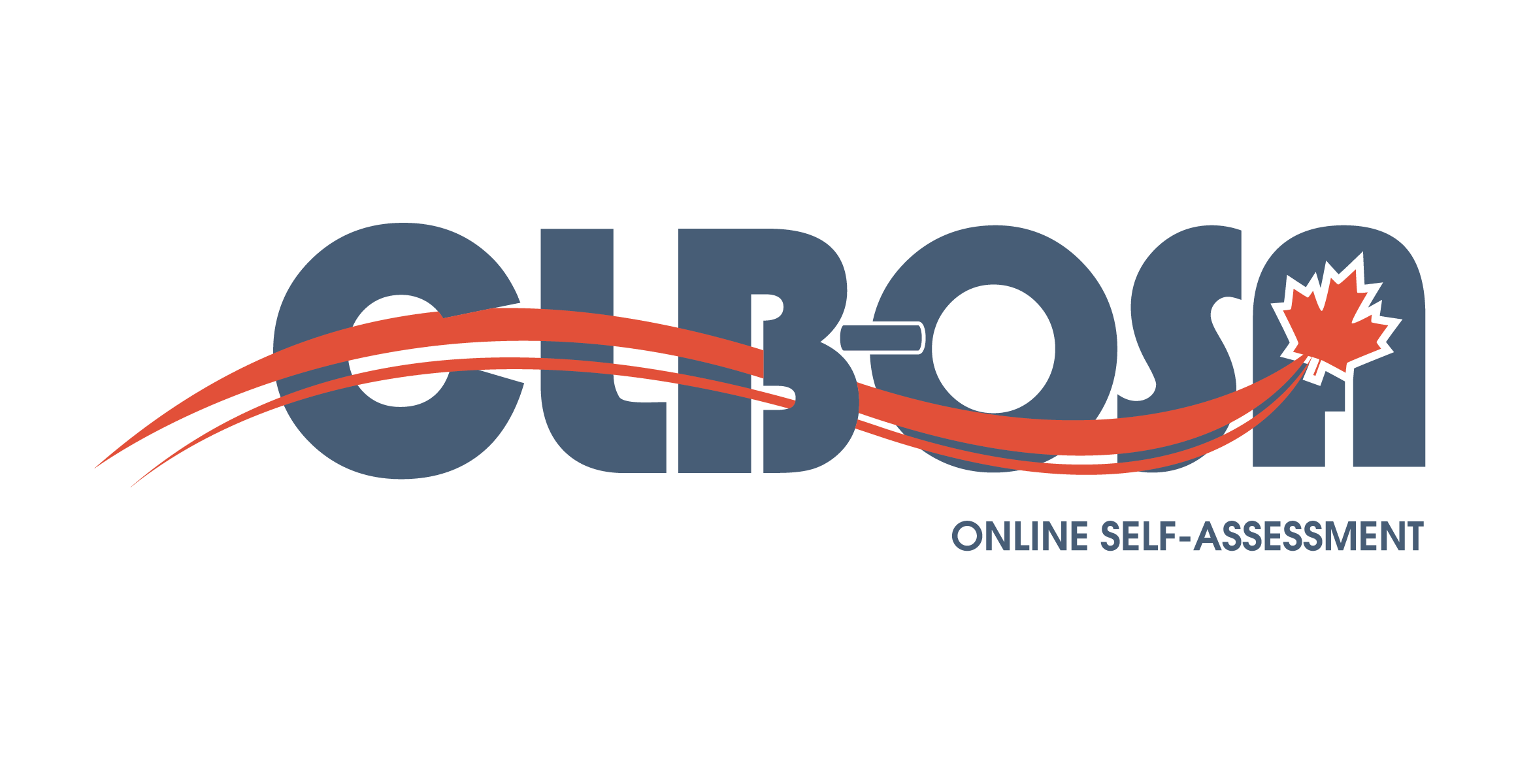
Assess your English online for FREE! Test your general language skills based on the Canadian Language Benchmarks
Estimate what you think your level is with our Can Do Statements publication.
The Can Do Statements are based on the Canadian Language Benchmarks (CLB). They describe what learners can do at benchmarks 1 to 12 in the skills of Listening, Speaking, Reading and Writing. The purpose of these statements is to present some of the information in the CLB document in language that is accessible to learners. The statements can help to facilitate discussions between you and your learners about what they have accomplished and what they still need to develop.
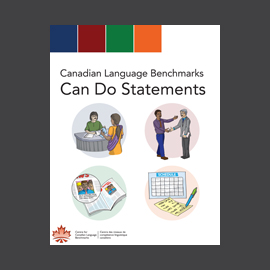
Formal Assessment
CLBPT is a low stakes test and cannot be used for employment, academic, immigration or citizenship purposes. For more information regarding the accepted language tests for Canadian Immigration or Citizenship application, click here. You can also find more information here.
If you’ve already taken one of the approved language tests required for your application but would like to know how it compares to CLB levels, please visit this page.
For any other information regarding immigration or Citizenship, please contact IRCC directly.
Assessment Centres
Most immigrant service organizations and school boards offering ESL classes can help you find a Language Assessment Centre.
Please note that each province has different criteria of eligibility. To learn more on this matter, contact the assessment centre nearest you.
What are the steps you need to take in order to be assessed at an assessment centre?
- Screening: You must contact an assessment centre near you to book your appointment and/or initial screening for eligibility. See below for a complete listing of assessment centres.
- Time you need: The assessment may take up to three hours.
- Documents: At some point, you will be asked to show your documents. Remember, they have to be originals, not copies.
- Assessment: There are 4 parts to the assessment: reading, writing, listening and speaking. You will be rated on each skill by performing tasks or activities. You will meet an assessor who will work with you. If you do not understand something, remember to ask. The assessors are good at their job. They are trained and will be professional.
- Results: You will be assigned a benchmark level for each of the 4 skills. They may be the same or they may all be different. If you speak English better than you write English, you will have a higher benchmark for speaking. Your benchmarks will change over time. As you get better at using English, your benchmarks will go up.
- Next Steps: Once you have a benchmark level, you can find a class that meets your needs.
CCLB has also developed a flyer to better understand your CLBPT assessment report which can be found here.
The Centres are listed alphabetically by province. If you are eligible and would like to be assessed in English as a Second Language, simply find the province you reside in from the list below, and contact the Assessment Centre nearest you.
Alberta
CLARC – Brooks Language Assessment & Referral Centre
#101B, 403-2 Street West
Brooks, AB T1R 0E8
Tel: 403-444-1509
Web: www.immigrantservicescalgary.ca
CLARC – Calgary Assessment and Referral Centre
1400-910, 7th Avenue SW
Calgary, AB T2P3N8
Tel: 403-265-1120
Web: www.immigrantservicescalgary.ca
Catholic Social Services (LARC)
8212 – 118 Avenue
Edmonton, AB T5B 0S3
Tel: 780-424-3545
Web: larcc.cssalberta.ca
NorQuest College
Rural Itinerant Services
11140-131st Street
Edmonton, AB T5M 1C1
Tel: 780-644-6700
*Referrals are made through the LINC Rural Delivery and LINC Home Study Programs
Keyano College
8115 Franklin Avenue
Fort McMurray, AB T9H 2H7
Tel: 780-792-5706 or 780-791-8943
Web: www.keyano.ca
CLARC – Lethbridge Language Assessment & Referral Centre
#410, 5th Sreet South
Lethbridge, AB T1J 2B7
Tel: 403-705-0540
Web: www.immigrantservicescalgary.ca
CLARC – Medicine Hat Language Assessment & Referral Centre
#222, South Railway Street SE
Medicine Hat, AB T1A 2V3
Tel: 403-454-6708
Web: www.immigrantservicescalgary.ca
Central Alberta Refugee Effort
202-5000 Gaetz Avenue
Red Deer, AB T4N 6C2
Tel: 403-346-8818
Web: immigrant-centre.ca
British Columbia
Archway (formerly Abbotsford Community services)
2420 Montrose Avenue
Abbotsford, BC V2S 3S9
Tel: 604-309-4092
Email: assessments@archway.ca
Web: www.archway.ca
University of the Fraser Valley
33844 King Road
Abbotsford, BC V2S 7M8
Tel: 604-504-7441
Web: www.ufv.ca
Multicultural and Immigrant Services Association of North Vancouver Island
200-1170 Shoppers Row
Campbell River, BC V9W 2C8
Tel: 250-830-0171
Email: crlinc@immigrantwelcome.ca
Web: www.immigrantwelcome.ca
Secondary location:
407A 5th Street
Courtenay, BC V9N 1J7
Tel: 250-338-6359
Email: cvlinc@immigrantwelcome.ca
Web: www.immigrantwelcome.ca
Chilliwack Community Services
45938 Wellington Avenue
Chilliwack, BC V2P 2C7
Tel: 604-793-7220
Web: www.comserv.bc.ca
North Island College
2300 Ryan Road
Courtenay, BC V9N 8N6
Web: www.nic.bc.ca
Cowichan Intercultural Society
205-394 Duncan Street
Duncan, BC V2L 3W4
Tel: 250-748-3112
Web: cis-iwc.org
Fort St John Literacy Society
#201 10136 100 Ave.
Fort St. John, BC V1J 1Y6
Tel: 250-785-2110
Web: fsjliteracy.ca
Columbia Basin Alliance for Literacy
712B – 10th Street, Box 2619
Invermere, BC V0A 1K0
Tel: 250-342-2475
Email: info@cbal.org
Web: www.cbal.org
Kamloops Immigrant Services
448 Tranquille Road
Kamloops, BC V2B 3H2
Tel: 778-470-6101
Web: immigrantservices.ca
Ki-Low-Na Friendship Society
442 Leon Avenue
Kelowna, BC V1Y 6J3
Tel: 250-763-4905
Web: www.kfs.bc.ca
Central Vancouver Island Multicultural Society
101 – 319 Selby Street
Nanaimo, BC V9R 2R4
Tel: 250-753-6911
Email: admin@cvims.org
Web: www.cvims.org
South Okanagan Immigrant and Community Services
340 Ellis Street
Penticton, BC V2A 4L7
Tel: 250-492-6299 x:208
Email: admin@soics.ca
Web: www.soics.ca
Immigrant and Multicultural Services Society
1270 – 2 Avenue
Prince George, BC V2L 3B3
Tel: 250-562-2900
Web: www.imss.ca
Northwest Community College
353 Fifth Street
Prince Rupert, BC V8J 3L6
Tel: 250-624-6054
Web: www.nwcc.bc.ca
Smithers Community Services Association
3815-B Railway Avenue, Box 3759
Smithers, BC V0J 2N0
Tel: 250-847-9515
Web: www.scsa.ca
Immigrant Services Society of BC
101– 38085 Second Avenue
Squamish, BC V8B 0C3
Tel: 604-567-4490
Email: linc.squamish@issbc.org
Surrey Language Assessment Centre (Serving Surrey, Langley, Aldergrove, Abbotsford, North Delta, Tri-Cities, New Westminster and Maple Ridge)
202-7337 137 Street
Surrey, BC V3W 1A4
Tel: 604-507-4150
Email: surreylac@telus.net
Western ESL Services
(Serving Vancouver, North Shore, Richmond, Burnaby and South Delta)
208-2525 Commercial Drive
Vancouver, BC V5N 4C1
Tel: 604-876-5756
Immigrant Services Society of BC
#601 – 333 Terminal Avenue
Vancouver, BC V6A 4C1
Tel: 604-684-2561 (Reception) or 604-684-7498 (Settlement)
Web: issbc.org
MOSAIC Language Assessment Services
206 – 2555 Commercial Drive
Vancouver, BC V5N 4C1
Tel: 604-708-3905
Web: www.mosaicbc.org
Vancouver Community College Assessment Centre
Broadway Campus
Room 4027, 4th Fl, Bldg A
1155 East Broadway
Vancouver, BC V5T 4V5
Tel: 604-871-7093
Email: assessments@vcc.ca
Web: www.vcc.ca
Valerie Macdonald
Remote testing throughout BC
Limited HCAP and rural client appointments by referral only
Vernon and District Immigrant and Community Services Society
100-3003- 30th Street
Vernon, BC V1T 9J5
Tel: 250-542-4177
Web: www.vdicss.com
Camosun College, English Language Development
Interurban Campus
Room 134, Center for Business and Access Building
4461 Interurban Road
Victoria, BC V9E 2C1
Tel: 250-370-4951
Email: eldregistration@camosun.ca
Inter-Cultural Association of Greater Victoria
930 Balmoral Road
Victoria, BC V8T 1A8
Tel: 250-388-4728
Web: www.icavictoria.org
Victoria Immigrant and Refugee Centre Society
1004 North Park Street
Victoria, BC V8T 1C6
Tel: 250-361-9433
Fax: 250-361-1914
Email: info@vircs.bc.ca
Web: www.vircs.bc.ca
Cariboo-Chilcotin Partners for Literacy Society
118C North First Avenue
Village Square
Williams Lake, BC V2G 1Y8
Tel: 778-412-9333
Email: susan@caribooliteracy.com or shelly@caribooliteracy.com
Web: www.caribooliteracy.com
Manitoba
Westman Immigrant services Assessment Centre
1001 Pacific Avenue
Brandon, MB R7A 0J2
Tel: 204-727-6031
Email: info@westmanimmigrantservices.ca
Web: www.westmanimmigrantservices.ca
Regional Connections Inc.
2 – 295 Perry Street
Winkler, MB R6W 0K9
Tel: 204-325-4059
Web: regionalconnections.ca
Winnipeg English Language Assessment and Referral Centre
400 – 275 Portage Avenue
Winnipeg, MB R3B 2B3
Tel: 204-943-5387
Web: www.welarc.net
New Brunswick
Centre d’apprentissage des langues du CCNB
(many locations, please contact CCNB for more details)
725 rue Collège
Bathurst, NB E2A 4G1
Tel: 1-844-223-8603
Email: langues@ccnb.ca
Web: ccnb.ca
Newfoundland
Association for New Canadians
144 Military Road
St. John’s, NL A1C 2E6
Tel: 709-726-6848
Email: linc@nfld.net
Web: www.ancnl.ca
Nova Scotia
Learn English NS Testing and Counselling Centre
221-6169 Quinpool Road
Halifax, NS B3L 1R4
Tel: 902-431-8675
Email: applications@learnenglishns.org
Web: www.learnenglishns.org
Ontario
Language Assessment Services
(Itinerant services, location arranged by appointment only)
Belleville/Kingston, ON
Tel: 613-453-8144
Email: knoble@languageassessment.ca
Web: www.languageassessment.ca
Grand Erie Learning Alternatives
Joseph Brant Learning Centre
347 Erie Avenue
Brantford, ON N3T 5V3
Tel: 519-429-9299
Web: www.granderie.ca
YMCAs of Cambridge & Kitchener-Waterloo
Cambridge/Kitchener, ON
Cambridge Office 519-621-1621
Kitchener Office 519-579-9622
Web: ymcacambridgekw.ca
T.R. Leger School
1500 Cumberland Street
Cornwall, ON K6J 4K9
Tel: 613-933-9626
Web: www.cornwalllinc.ca
Immigrant Services Guelph-Wellington
104 Dawson Rd., Unit 102
Guelph, ON N1H 1A6
Tel: 519-836-2222
Web: www.is-gw.ca
YMCA of Hamilton/ Burlington/ Brantford
25 Main Street West, Suite 105
Hamilton, ON L8P 1H1
Tel: 905-526-8452
Web: www.ymcahbb.ca
Collège Boréal
*assessments only offered for learners enrolled or soon to be enrolled in the Collège Boréal LINC program
Hamilton (Many location, please contact for more information)
Tel: 1-905 544-9824 or 1-800-361-6673
Email: newcomers@collegeboreal.ca
Web: www.collegeboreal.ca
London Cross Cultural Learner Centre
505 Dundas Street
London, ON N6B 1W4
Tel: 519-432-1133
Web: lcclc.org
YMCA-YWCA of the National Capital Region
Language Assessment and Referral Centre
240 Catherine Street, Suite 308
Ottawa, ON K2P 2G8
Tel: 613-238-5462
613-286-6146
613-219-8425
Email: larc.celo@ymcaywca.ca
Web: www.ymcaywca.ca
YMCA-YWCA of the National Capital Region
Language Assessment and Referral Centre
1642 Merivale Road, 2nd Floor (Merivale Mall)
Ottawa, ON K2G 4A1
Tel: 613-688-2150
613-404-1559
343-961-5259
Email: larc.celo@ymcaywca.ca
Web: www.ymcaywca.ca
New Canadians Centre
221 Romaine Street
Peterborough, ON K9J 2C3
Tel: 705-743-0882
Email: info@nccpeterborough.ca
Web: www.nccpeterborough.ca
YMCAs across Southwestern Ontario
660 Oakdale Avenue
Sarnia, ON N7V 2A9
Tel: 519-336-5950
Web: www.ymcaswo.ca
YMCA Employment & Newcomer Services
(many locations, please contact YMCA for more details)
St. Catharines, ON
Tel: 289-296-8400 or 289-213-5311
Web: ymcaofniagara.org
Thunder Bay Multicultural Association
17 North Court Street
Thunder Bay, Ontario P7A 4T4
Tel: 807-345-0551
Toll Free: 1-866-831-1144
Web: www.thunderbay.org
Achēv
(many locations, please contact Achēv for more details)
Toronto – Peel, Halton and Dufferin regions, ON
Tel: 905-949-0049, ext. 1369
Web: https://achev.ca
Achēv
(many locations, please contact Achēv for more details)
Toronto – York, Simcoe and Durham regions, ON
Tel: 1-855-330-8655
Web: https://achev.ca
YMCA of Greater Toronto
(many locations, please contact YMCA for more details)
Toronto, ON
Tel: 416-925-5462
Web: www.ymcagta.org
Language Assessment and Resource Centre
1410 Ouellette Avenue
Windsor, ON N8X 5B2
Tel: 519-253-2724
Web: www.larcwindsor.org
Prince Edward Island
PEI Association for Newcomers to Canada
49 Water Street
Charlottetown, PEI C1A 1A3
Tel: 902-628-6009 ext. 215
Web: www.peianc.com
Saskatchewan
Southeast College
532 Bourquin Road
Estevan, SK S4A 1C8
Tel: 306-634-4795
Web: www.southeastcollege.org
Carlton Trail College
611 17 Street
Humboldt, SK S0K 2A1
Tel: 306-682-2623 or 1-800-667-2623
Email: information@carltontrailcollege.com
Web: www.carltontrailcollege.com
North West College
10702 Diefenbaker Drive
North Battleford, SK S9A 4A8
Tel: 306-937-5100
Web: northwestcollege.ca
Language Assessment and Referral Centre – International Women of Saskatoon
100-2445 13th Avenue
Regina, SK S4P 0W1
Tel: 306-525-5272
Email: larcregina.iws@gmail.com
Web: www.larcsaskatchewan.org
Language Assessment and Referral Centre – International Women of Saskatoon
201-336 5th Avenue North
Saskatoon, SK, S7K 2P4
Tel: 306-651-5272
Email: info@larcsaskatoon.org
Web: www.larcsaskatoon.org
The Newcomer Information Centre
106, 129 – 3rd Avenue North
Saskatoon, SK S7K 2H4
Tel: 306-343-8303
Email: info@nicstoon.org
Web: nicstoon.org
Great Plains College
129 2nd Avenue NE
Swift Current, SK S9H 2C6
Tel: 306-773-1531
Email: swiftcurrent.office
Web: www.greatplainscollege.ca
Cumberland College
800 – 101 Street
P.O. Box 967
Tisdale, SK S0E 1T0
Tel: 306-873-2525
Email: crc.tisdale@cumberlandcollege.sk.ca
Web: www.cumberlandcollege.sk.ca
Parkland Regional College
200 Prystai Way
Yorkton, SK S3N 4G4
Tel: 306-783-6566
Web: www.parklandcollege.sk.ca
Yukon/Northwest Territories/Nunavut
Aurora College
5004-54th Street
Yellowknife, NWT X1A 2R6
Tel: 1-866-291-4866 or 1-867-920-3030
Email: info@auroracollege.nt.ca
Web: www.auroracollege.nt.ca
Multicultural Centre of the Yukon
4141D 4 Avenue
Whitehorse, YK Y1A 1J1
Tel: 1-867-667-6205
Web: mcyukon.com
Other Types of Language Assessment
There are other assessments that have been compared to the Canadian Language Benchmarks or developed based on them. They are listed below. If you have been assessed already with one of these tools, you may already know your language level.
- The CELBAN was developed to assess the language levels of internationally trained nurses who want to work in the nursing field in Canada. To find out more, click on CELBAN
- CanTEST This is an assessment tool used by the University of Ottawa. CanTEST has been compared to Canadian Language Benchmarks. Benchmarks 7-11 are needed for academic and professional services. Click CanTEST to find out more.
Understanding your Canadian Language Benchmarks Placement Test Assessment (CLBPT) Report
With funding from Citizenship and Immigration Canada CCLB produced a flyer based on CLBPT tasks and CLB Can Do Checklists. This flyer may be handed out to CLBPT test-takers and others who may be interested in what CLBPT results mean. Through funding from Ontario’s Ministry of Citizenship and Immigration, the flyer Understanding your CLBPT Assessment Report has also been translated. See below for the available languages.
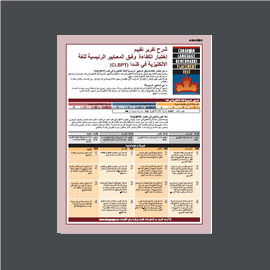
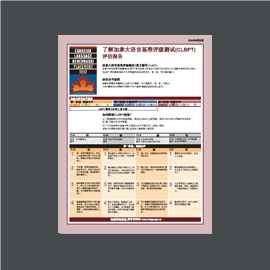
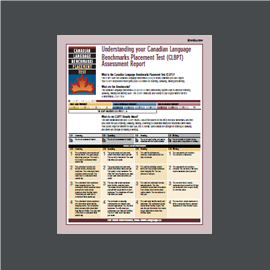
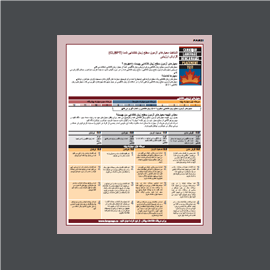

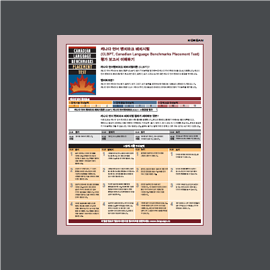
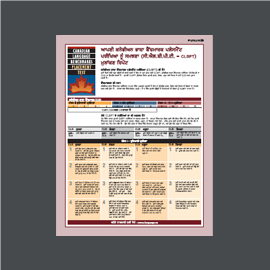
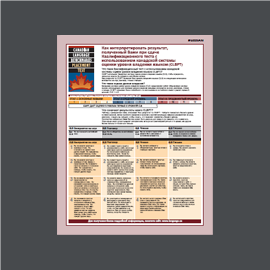
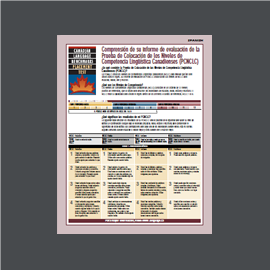
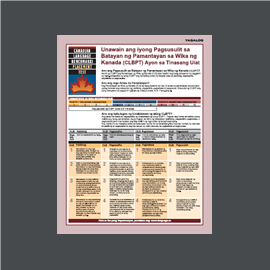
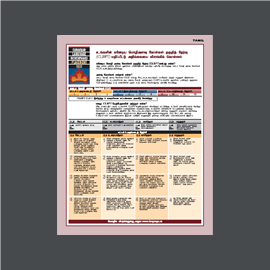
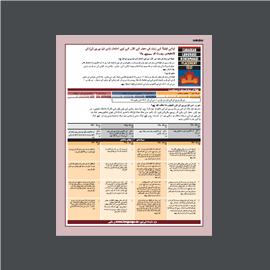
More Information
pronuncian.com site will give you opportunities to practice pronunciation.
www.eslcafe.com is a site called Dave’s ESL cafe. There is lots for learners including idioms, quizzes, slang and forums where you can write opinions and comments to share with other people learning English.
Immigrate to Canada is a Canadian Government site that has information for newcomers or individuals planning on coming to Canada.
LINC Programs In Canada tells you how to find LINC programs and assessment centres across the country.
ESL in Canada Directory this is a commercial site, but it has free grammar lessons.
Information Newcomers Can Trust while this is an Ontario site, a lot of the information is useful in other parts of the country.
CanadaInfo this site has lots of information about Canada.
CBC News this site allows you to check the news in the country.
CBC Newsonline Special Feature: The Way We Work is a great site about working in Canada
Dictionary and Thesaurus – Merriam-Webster Online this on-line dictionary is an excellent resource not just for the meaning of a word but how it sounds.
Frequently Asked Questions
What are the Canadian Language Benchmarks?
The Canadian Language Benchmarks (CLB) are the standard used in Canada to teach and to test language learning in adult ESL programs. The CLB describe what people who are learning English as a Second Language (ESL) can do in daily life.
These are things that people at different benchmark levels can do.
- Can you make an appointment with a doctor?
- Can you fill out a job application?
- Can you understand what you hear on radio and T.V.?
- Can you write a letter to your employer?
Use the Can Do Statements publication checklists to help you understand your benchmark levels.
Do you know your Canadian Language Benchmarks (CLB)?
Assessment centres and adult English as a Second Language (ESL) schools can assess your level of English now. After the assessment, you will receive a Canadian Language Benchmarks report. This information will help you find a class that is best for you.
How many benchmarks are there?
In total there are twelve benchmarks for:
- Listening 1 – 12
- Speaking 1 – 12
- Reading 1 – 12
- Writing 1 – 12
It is common for ESL students to have different benchmarks in listening, speaking, reading and writing.
An ESL student at Benchmark 1 has little or no English. A person at Benchmark 11 or Benchmark 12 in speaking, can speak English like a native speaker. Students who are at Benchmark 8 or Benchmark 9 or higher usually have enough English to begin a college or university program.
Do you know someone who cannot read or write in their first language?
There are different benchmarks for English as a Second Language students who have trouble with reading and writing.
Find out more in the CLB: ESL for Adult Literacy Learners publication.
Why are benchmarks important to you?
- Benchmarks are used in most adult ESL schools in Canada to plan teaching programs for adults.
- Benchmarks can help you to plan for the future as you learn English.
- Benchmarks can help an employer to know if you have the level of English needed to do the job.
- Benchmark reports can help you to move from school to school or from city to city.
- Benchmarks can help you to plan for study or work in the future.
- Benchmarks can help you update your immigration status or become a Canadian Citizen.
Are you looking for an ESL class?
If you are looking for an ESL class to help you or a friend improve English language skills, go to an assessment centre or to an adult ESL school in your community. You can find an Assessment Centre in your area on this page under the Formal Assessment tab.


